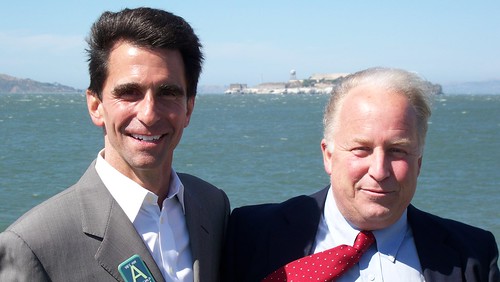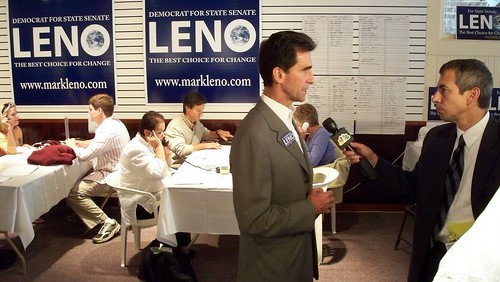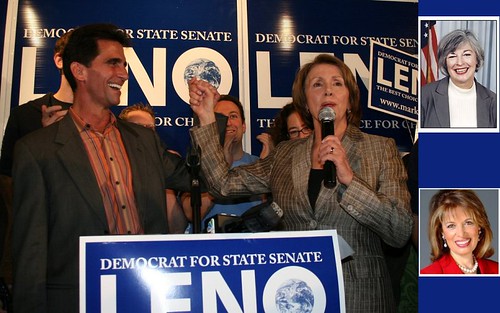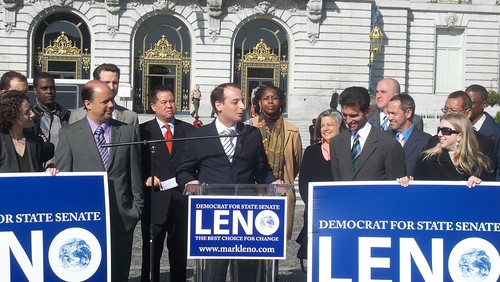With today being Earth Day, I thought readers would enjoy reading my article about Joe Nation’s environmental record.
Ex-Marin Assemblyman and State Senate candidate Joe Nation is working to stay above the fray between Mark Leno and Carole Migden. Despite his moderate record on other issues, he speaks earnestly about the environment and climate change. But why hasn’t the Sierra Club endorsed him, and why is he not popular with environmentalists in Marin County? It may be because when Nation was on the Marin Municipal Water District in the late 1990’s, he proposed bottling water from Mount Tamalpais, voted for a pipeline to siphon water from the Russian River and supported widening the US-101. Today, Nation is a climate change consultant for ENVIRON, where he primarily advises Coca-Cola – whose environmental record has spawned protests across the globe. Now Coca-Cola runs a corporate green-washing campaign that pushes “water stewardship” – which is code for privatization of a natural resource, while running bottled water plants in California.
As a newcomer to the very contentious Senate race (and a relative unknown to San Francisco voters), Nation has campaigned on his environmental record in the Assembly – and touts the work that he currently does on climate change. “I would not be in this race if it wasn’t for that issue,” he said at a candidates’ forum last month. Therefore, it is helpful to hear what local environmentalists think about him.
The Sierra Club has not endorsed in the race – which is interesting, because Joe Nation has made climate change such a top priority in his campaign. Nobody on their Board would talk to me on the record (the Club is still deciding what to do), but it was clear from learning about Nation’s history in Marin that he is not well liked among many environmentalists.
After losing an open Congressional race in June 1992, Nation was elected later that year to the Marin Municipal Water District – a very powerful stepping stone for higher office. Three of Marin’s last 4 Assembly members have served on that board, including Nation – who ran for an open Assembly seat in March 2000. The Sierra Club did not endorse him in that race, and when two progressive opponents split their votes, Nation eked out a victory.
In 1999, Nation angered environmentalists by sponsoring a proposal that the Marin Water District sell bottled water from Mount Tamalpais. Activists opposed it because draining water from Redwood Creek (which flows from Mount Tam) would endanger a salmon run. At a time when Marin residents were being asked to conserve water, they opposed having the District sell off such natural resources. Bottled water, they said, is also a very wasteful practice – as it consumes large amounts of plastic.
After much community opposition, the Marin Water District shot down Nation’s idea. Shortly afterwards, they passed an ordinance prohibiting such a proposal in the future.
In 2000, the Marin Water District (with Nation’s support) agreed to move ahead with plans for a new multimillion-dollar pipeline to siphon water from the Russian River. Again, environmentalists opposed the idea – as it involved extracting natural resources when they urged the need for more conservation. As he ran for the Assembly that same year, Nation supported widening the US-101 to relax gridlock – a reason why the Sierra Club did not endorse him (as their chosen candidate opposed it.)
Nation did get support from the League of Conservation Voters in his initial Assembly bid – prompting environmental legend David Brower to write an angry press release. “Industry and pro-development politicians grow increasingly skilled at adopting green camouflage,” said Brower, as he accused Nation of being “the candidate favored by developers.” At the time, Nation replied that he was a “realist” – not a “purist.”
In the Assembly, Nation’s voting record was solidly pro-environment (the Sierra Club endorsed him when he faced token opposition) – but some complained that he was more of a follower than a leader. His signature bill was AB 32, the Global Warming Solutions Act of 2006, that Governor Arnold Schwarzenegger signed – which capped carbon emissions, but most environmentalists agree is not enough.
Since leaving the Assembly in 2006 (after a second bid for Congress against Lynn Woolsey), Nation now works as a Climate Change Consultant for ENVIRON — which has a global staff of over 1,000 and helps corporations become more environmentally sound. Most of Nation’s consulting work at ENVIRON, he says, is on behalf of Coca-Cola.
“We do a range of work for Coke,” he said, “and have lots of very smart people who count carbon molecules and do carbon footprints. We’ll go in their facility and measure their energy use (CO2), and look at ways on how they can reduce it. We give them recommendations on alternative technologies that they can use. My expertise is in the area of off-sets and carbon emissions trading.”
Coca-Cola does not have the best environmental record. The company manages bottling plants throughout the world – and its water-pumping in India has drained the wells of the country’s most impoverished villages. Students on over 20 college campuses in the U.S. and Great Britain have succeeded in getting their schools to divest from Coke due to its repeated violations of environmental law.
Of course, Nation can argue that he’s helping Coke fix its environmental problems. But even the company’s “green” improvements are under scrutiny. “Coca-Cola has done a lot to greenwash their corporate image,” said Nick Guroff of Corporate Accountability, a non-profit organization that monitors corporate violations. On its website, Coca-Cola features an environmental report that touts its “water stewardship” plan – which critics say is really just an effort to privatize a natural resource that people need in order to survive.
Coca-Cola says it’s doing what it can to reduce waste – as it makes less wasteful plastic bottles and plans to build a plant that will recycle 100 million pounds of plastic every year. But activists – including Rev. Renee Rico from San Anselmo in Marin County – aren’t buying it. “Don’t make the [water] bottles in the first place, and you won’t have to waste even more energy to recycle them,” she said.
An online campaign by Corporate Accountability is currently underway – urging consumers to drink tap water rather than buy bottled water from Coca-Cola and other companies. The group recently convinced S.F. Mayor Gavin Newsom to ban plastic water bottles in all City government buildings.
Nation’s work for Coca-Cola is consistent with his advocacy for bottled water nine years ago on the Marin Municipal Water District. Today, bottled water is a growing industry – and Coke runs a plant near Mount Shasta despite opposition from the environmental community. It would help Coke to have someone like Joe Nation in the California State Senate – especially a Democrat who touts his green credentials.
EDITOR’S NOTE: As a private citizen, Paul Hogarth has endorsed Mark Leno for State Senate. He plays no role for the Leno campaign, nor did anyone on that campaign assist in this story.








